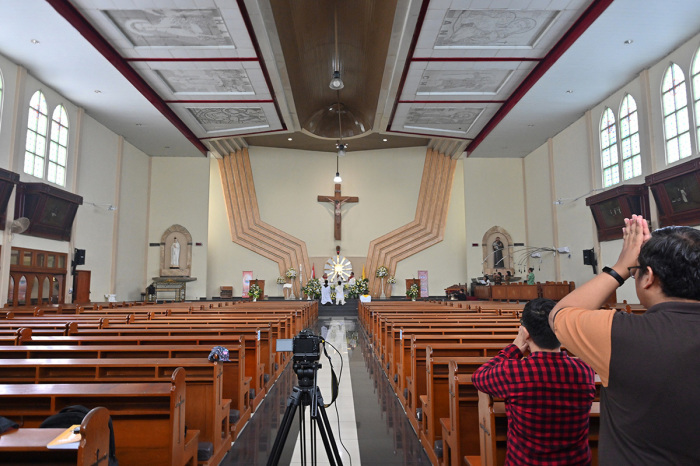Indonesia VP pushes back on plan to make it easier to build churches

SURABAYA, Indonesia — Opposition has emerged to a proposal by Indonesia’s Ministry of Religious Affairs to do away with the role of a Muslim-dominated body that has complicated efforts by minority religions to build houses of worship.
Indonesia’s vice president last week warned against the effort to end the role of the Muslim-dominated Interreligious Harmony Forum (Forum Kerukunan Umat Beragama, or FKUB). Vice President Ma’ruf Amin, whose term ends in October, told reporters on Aug. 7 that the minister of religious affairs should not have made the proposal.
“The rule of establishing houses of worship is an agreement from religious councils,” he said, as reported by detik.com.
Ma’ruf Amin said the Ministry of Religious Affairs should review the basis for FKUB recommendations to establish houses of worship, saying ministry officials should listen to the parties who were involved in formulating the regulation.

“First, take a look at the reasons for what and why the regulation occurred — there are reasons why the regulation was made,” he said. “And listen to many opinions from those involved at that time.”
Ma’ruf Amin helped establish the FKUB’s role.
“The agreement was made after four months and in 11 meetings,” he reportedly said. “I remember I was the one who gave birth to it. From the results of those discussions, an agreement was made and then stated as a joint regulation of the minister of religion and the minister of home affairs.”
Indonesia Minister of Religion Affairs Yaqut Cholil Qoumashad had announced that the government was planning to change regulations for construction of houses of worship to make it easier for religious minority groups to establish them, according to detik.com.
Speaking at the National Dialogue and National Working Meeting of the Greater Indonesia Christian Movement (Gekira) at the Bidakara Hotel in Jakarta on Aug. 3, Yaqut said that under the new regulations only recommendations for worship building construction by local branches of the Department of Religious Affairs would be considered.
“The government, to show its presence among the religious minority groups, considers the recommendation for the establishment of a house of worship is sufficient only with the ministry of religion, and from now on revokes the role of FKUB,” Yaqut said.
Stating that taking recommendations from the FKUB into consideration complicates efforts by minority religious communities to build houses of worship, Yaqut then promised that the regulations would be issued soon.
There are two requirements under current law that religious groups must meet, he said.
“Of course, this makes it difficult for all of you, especially when there are many Muslims and the majority there,” Yaqut said. “Yesterday, the coordinating minister for political, legal and security affairs agreed with us and the minister of home affairs for this to be made into a presidential regulation. So, in a moment, hopefully, the establishment of these houses of worship will no longer be difficult.”
The last-minute appeal by the vice president of Joko Widodo’s administration, however, concerned Bonar Tigor Naipospos, deputy chair of rights organization Setara Institute for Democracy and Peace, who said he was worried that rejection would delay implementation of the new regulation.
“The problem is, Ma’ruf Amin’s statement could represent a great power behind him — the power of Islamists who are not always in line with moderate Indonesians,” Bonar told Morning Star News.
Ma’ruf Amin is the leader of the Majelis Ulama Indonesia (Indonesian Ulema Council, or MUI), the country’s top Islamic scholarly body, which tends to be conservative.
Ma’ruf was a key figure in several fatwas issued by the MUI that promote intolerance and fuel violations of the constitutional rights of minorities by vigilante groups, Bonar said. These fatwas include rulings against secularism, pluralism and religious liberalism in 2005, the heresy of Ahmadiyah in 2008, and blasphemy against the Quran and clerics in Basuki Tjahaja Purnama’s (Ahok) speech in 2016.
Bonar said that many of the views of Ma’ruf Amin and the MUI impede the advancement and fulfillment of the constitutional rights of minority groups.
Christian support
Two Indonesian leading organizations hosting hundreds of Christian denominations responded positively to the new regulations.
The head of the Communion of Indonesian Churches (Persatuan Gereja Indonesia, or PGI), Pastor Gomar Gultom, said the proposed policy is in line with the longstanding proposal PGI submitted to President Widodo, Minister of Religious Affairs Yaqut and Minister of Home Affairs Tito Karnavian.
“It is extremely absurd that the state’s authority to grant or not grant a permit to establish a house of worship can be canceled by the FKUB’s recommendation, while it’s not a state apparatus,” Gomar told CNNIndonesia.com on Aug. 4.
He added, however, that he doubted whether the change would make it easier to establish houses of worship.
“But anyway, the new regulation is an effort to fulfill the mandate of Article 29 of the 1945 Constitution,” he said.
The chairman of the Setara Institute concurred.
“I see the step as compatible with Indonesia’s diversity system consisting of various religious identities and beliefs,” Hendardi, who goes by a single name, said last Tuesday.
Setara has long pushed the government to simplify the process of establishing houses of worship and take progressive measures to eliminate discriminatory provisions in the joint decree that gave rise to difficulties for minority religions to obtain building permits, according to Hendardi.
The Indonesian Bishops’ Conference (Konperensi Wali Gereja Indonesia, or KWI) stated that it appreciates the plan, saying it would streamline bureaucracy. The KWI also asked the Ministry of Religious Affairs to review other requirements for building houses of worship, in addition to revoking the FKUB recommendation.
Indonesia ranked 42nd on the Christian support organization Open Doors’ 2024 World Watch List of the 50 countries where it's most difficult to be a Christian. Indonesian society has adopted a more conservative Islamic character, and churches involved in evangelistic outreach are at risk of being targeted by Islamic extremist groups, according to the WWL report.
Originally published at Morning Star News
Morning Star News is the only independent news service focusing exclusively on the persecution of Christians. The nonprofit's mission is to provide complete, reliable, even-handed news in order to empower those in the free world to help persecuted Christians, and to encourage persecuted Christians by informing them that they are not alone in their suffering.




























